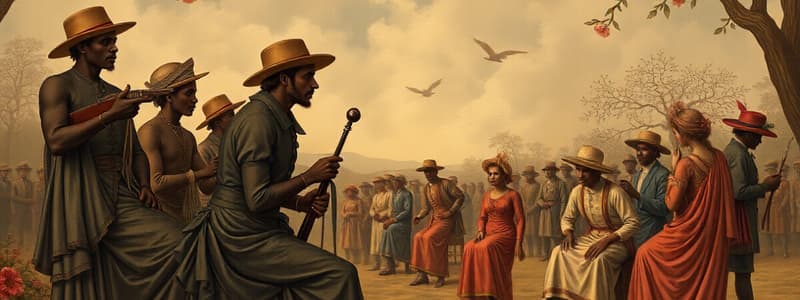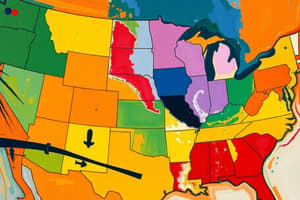Podcast
Questions and Answers
What was one significant outcome of the Missouri Compromise related to territorial expansion?
What was one significant outcome of the Missouri Compromise related to territorial expansion?
- It allowed unrestricted settlement in all territories.
- It established the 36°30′ boundary. (correct)
- It abolished slavery in all territories.
- It mandated equal representation for free and slave states.
How did political decisions around slavery correlate with public sentiment in the lead up to the Civil War?
How did political decisions around slavery correlate with public sentiment in the lead up to the Civil War?
- They remained neutral to avoid conflict.
- They were increasingly influenced by sectional divides. (correct)
- They became increasingly disconnected from public opinion.
- They reflected an emerging consensus on slavery.
What effect did the Kansas-Nebraska Act have on territorial expansion strategies?
What effect did the Kansas-Nebraska Act have on territorial expansion strategies?
- It reinforced previous restrictions on slavery.
- It allowed territorial expansion to occur without safeguards. (correct)
- It created a stable process for new state admissions.
- It prioritized free-state settlers over slave-state settlers.
Which of the following best describes the public debate over slavery during the period leading to the Civil War?
Which of the following best describes the public debate over slavery during the period leading to the Civil War?
What was a critical flaw in the compromises made regarding slavery?
What was a critical flaw in the compromises made regarding slavery?
What was a key characteristic of the Compromise of 1850?
What was a key characteristic of the Compromise of 1850?
What was one of the main reasons the slave-related compromises ultimately failed?
What was one of the main reasons the slave-related compromises ultimately failed?
How did the creation of political factions, such as the Republican party, relate to the issue of slavery?
How did the creation of political factions, such as the Republican party, relate to the issue of slavery?
What did the Missouri Compromise primarily aim to achieve?
What did the Missouri Compromise primarily aim to achieve?
What was a direct outcome of the Kansas-Nebraska Act?
What was a direct outcome of the Kansas-Nebraska Act?
Which compromise admitted California as a free state while introducing a stricter Fugitive Slave Act?
Which compromise admitted California as a free state while introducing a stricter Fugitive Slave Act?
How did the Compromise of 1850 affect public opinion regarding slavery?
How did the Compromise of 1850 affect public opinion regarding slavery?
What was one significant political ramification of the ongoing compromises related to slavery?
What was one significant political ramification of the ongoing compromises related to slavery?
What did the establishment of popular sovereignty in Kansas and Nebraska allow?
What did the establishment of popular sovereignty in Kansas and Nebraska allow?
What was the impact of the Missouri Compromise on the future expansion of slavery?
What was the impact of the Missouri Compromise on the future expansion of slavery?
What was a result of the tensions brought about by the Kansas-Nebraska Act?
What was a result of the tensions brought about by the Kansas-Nebraska Act?
Flashcards
Missouri Compromise (1820)
Missouri Compromise (1820)
A compromise that attempted to balance the number of free and slave states. It created a boundary line prohibiting slavery north of 36°30′ in the Louisiana Purchase.
Compromise of 1850
Compromise of 1850
A series of measures addressing the expansion of slavery, including California's admission as a free state and a stricter Fugitive Slave Act.
Kansas-Nebraska Act (1854)
Kansas-Nebraska Act (1854)
This act repealed the Missouri Compromise, allowing residents of Kansas and Nebraska to decide the legality of slavery through popular sovereignty.
Popular Sovereignty
Popular Sovereignty
Signup and view all the flashcards
Fugitive Slave Act
Fugitive Slave Act
Signup and view all the flashcards
Slavery's Expansion
Slavery's Expansion
Signup and view all the flashcards
Political Ramifications
Political Ramifications
Signup and view all the flashcards
Bleeding Kansas
Bleeding Kansas
Signup and view all the flashcards
Political Factions & Slavery
Political Factions & Slavery
Signup and view all the flashcards
Territorial Expansion & Compromise
Territorial Expansion & Compromise
Signup and view all the flashcards
Public Opinion & Slavery
Public Opinion & Slavery
Signup and view all the flashcards
Compromise Failures
Compromise Failures
Signup and view all the flashcards
Missouri Compromise
Missouri Compromise
Signup and view all the flashcards
Kansas-Nebraska Act
Kansas-Nebraska Act
Signup and view all the flashcards
Slavery & Political Division
Slavery & Political Division
Signup and view all the flashcards
Study Notes
Missouri Compromise (1820)
- Aimed to balance the number of free and slave states in the Union.
- Missouri admitted as a slave state, Maine as a free state.
- Established a boundary line (36°30′) across the Louisiana Purchase, prohibiting slavery north of the line.
- Temporarily reduced tensions but ultimately proved unsustainable.
- Triggered debate over the expansion of slavery into new territories.
Compromise of 1850
- A series of measures attempting to resolve the issue of slavery's expansion.
- California admitted as a free state.
- Tougher Fugitive Slave Act passed, requiring more direct federal involvement in the apprehension of escaped slaves.
- Popular sovereignty established in Utah and New Mexico territories regarding the question of slavery.
- Resulted in temporary peace but laid bare deep divisions in public opinion and heightened tensions.
- Disagreement over the method and legitimacy of legal standards and procedure for slavery remained.
Kansas-Nebraska Act (1854)
- Repealed the Missouri Compromise's dividing line, opening more land to potential slavery.
- Established popular sovereignty in Kansas and Nebraska, allowing residents to vote on the issue of slavery.
- Intense conflict arose in Kansas ("Bleeding Kansas") as pro-slavery and anti-slavery groups clashed violently over the territorial status of slavery.
- Led to the fragmentation of the Whig Party and the growth of the Republican Party.
- Increased the sectional divide and fueled the fire of the slavery debate.
- Political alignment shifted drastically.
Impact on Slavery
- The compromises continually redefined and redefined the relationship between the federal government and states’ rights (related to slavery)
- Missouri Compromise (temporarily) contained the expansion of slavery in the Louisiana Purchase, but its provisions were later overturned.
- The Compromise of 1850, while intending to quell tensions over slavery expansion, ultimately led to more conflict with stringent legislation for capturing runaway slaves.
- The Kansas-Nebraska Act directly disrupted the delicate balance of pro- and anti-slavery power. The act directly provoked the pro- and anti-slavery groups to directly confront each other physically.
- These events illustrate a complex interplay of legislative efforts and escalating violence surrounding the issue of slavery.
Political Ramifications
- The compromises severely strained the political unity of the nation.
- Created factions and parties (e.g., the Republican party was formed partly to challenge the expansion of slavery).
- Undermined the stability and predictability of the federal government.
- Each act saw an increased involvement in the issue of slavery due to escalating public debate.
- Political decisions of the time showed an increasingly strong correlation with public opinion.
Territorial Expansion
- These legislative efforts significantly impacted the strategies for territorial expansion.
- Missouri Compromise led to the establishment of the 36°30′ boundary, a crucial component in the westward expansion of the US.
- The Compromise of 1850 involved new territories, and how they would balance free and slave state status.
- Ultimately, the Kansas-Nebraska Act removed prior restrictions and allowed expansion to happen without the prior safeguards.
Public Opinion
- The debates over slavery were a critical factor in shaping public opinion in the lead up to the Civil War.
- Arguments for and against slavery spread rapidly with varying degrees of violence.
- The issues raised by the compromises deeply divided the population along sectional lines.
- Pro- and anti-slavery sentiment fueled a public discourse marked by passionate arguments and growing hostility.
- Compromises aimed to address public concern and desires regarding the expansion of slavery into new territories, but public resistance and dissatisfaction were prevalent.
Subsequent Laws
- These compromises were attempts to find a solution to the escalating dispute over the institution of slavery.
- However, underlying issues and tensions remained unresolved, ultimately leading to greater conflict and deeper societal divisions.
- Attempts to find compromise ultimately escalated tensions.
- The compromises highlighted the urgent need for a more comprehensive and unified approach to address the slavery issue but ultimately failed.
- These acts and laws were part of a complex political landscape influenced by economic interests and social values.
Studying That Suits You
Use AI to generate personalized quizzes and flashcards to suit your learning preferences.




